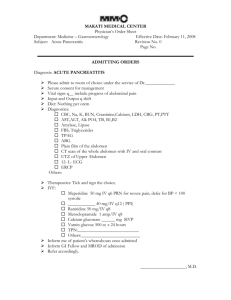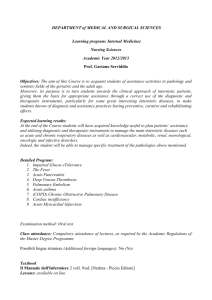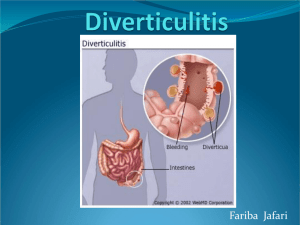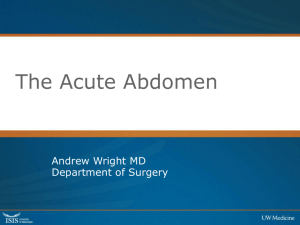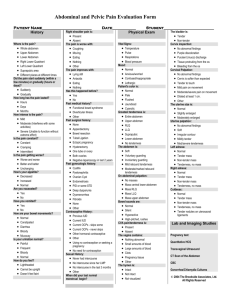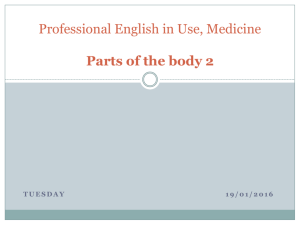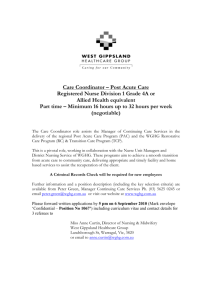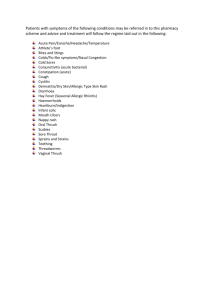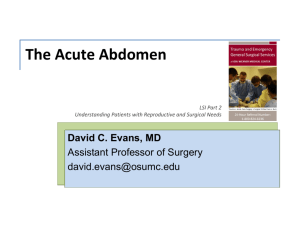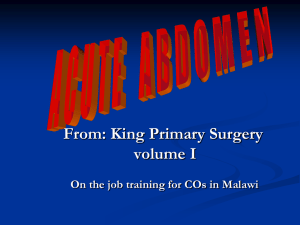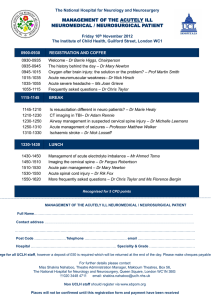Acute Abdomen Revision
advertisement
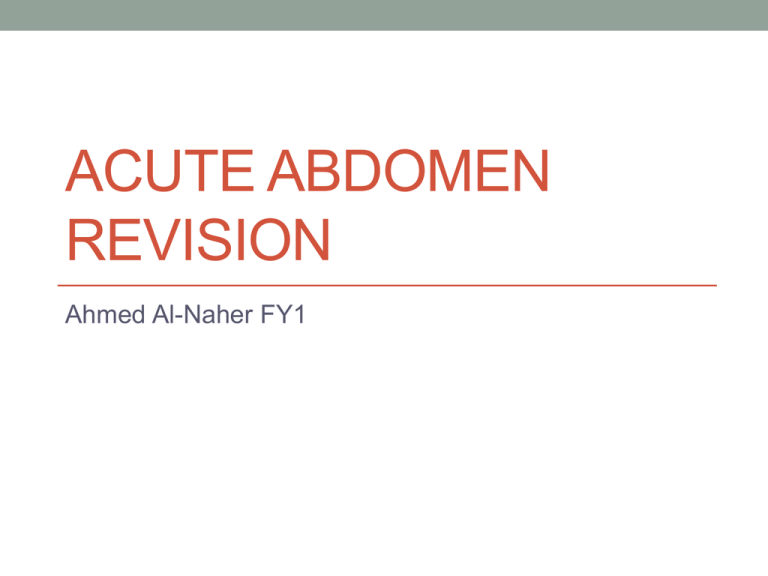
ACUTE ABDOMEN REVISION Ahmed Al-Naher FY1 Learning Objectives • Causes of an acute abdomen • Differential Diagnosis • Hx/Exam • Investigations • Management • Clinical Cases Causes of Acute Abdomen Intestinal Acute appendicitis, mesenteric adenitis, mekel’s diverticulitis, perforated peptic ulcer, gastroenteritis, diverticulitis, intestinal obstruction, strangulated hernia Hepatobiliary Biliary colic, cholecystitis, cholangitis, pancreatitis, hepatitis Vascular Ruptured AAA, acute mesenteric ischaemia, ischaemic colitis Urological Renal colic, UTI, testicular torsion, acute urinary retention Gynaecological Ectopic pregnancy, ovarian cyst pathology (rupture/haemorrhage into cyst/torsion), salpingitis, endometriosis, mittelschmerz (mid-cycle pain) Medical (can mimic an acute abdomen) Pneumonia, MI, DKA, sickle cell crisis, porphyria Acute Abdomen: The Examination • • • • • • • • Liver (hepatitis) Gall bladder (gallstones) Stomach (peptic ulcer, gastritis) Hepatic flexure colon (cancer) Lung (pneumonia) • • • Liver (hepatitis) Gall bladder (gallstones) Stomach (peptic ulcer, gastritis) Transverse colon (cancer) Pancreas (pancreatitis) Heart (MI) • Spleen (rupture) • Pancreas (pancreatitis) • Stomach (peptic ulcer) • Splenic flexure colon (cancer) • Lung (pneumonia) Ascending colon (cancer,) • Kidney (stone, hydronephrosis, UTI) • • Appendix (Appendicitis) • • Caecum (tumour, volvulus, closed loop obstruction) • • • • Terminal ileum (crohns, mekels) • Ovaries/fallopian tube (ectopic, cyst, PID) • Ureter (renal colic) • • Uterus (fibroid, cancer) • Bladder (UTI, stone) • Sigmoid colon (diverticulitis) • • Descending colon (cancer) Kidney (stone, hydronephrosis, UTI) Sigmoid colon (diverticulitis, colitis, cancer) Ovaries/fallopian tube (ectopic, cyst, PID) Ureter (renal colic) Small bowel (obstruction/ischaemia) Aorta (leaking AAA) Intestinal PU: H.pylori, NSAIDs, steroids, >55, M, alcohol, bloating, epigastric/retrosternal pain, worse with food, GI bleed Gastric Ca: Wt loss, smoking, blood grp A, GI bleed, epigastric pain, virchow’s node, acanthosis nigricans Hiatus hernia: F, obese, >55, GORD, epigastric, N+V high DU: epigastric pain, improves with food, worse at night Chrohns: transmural = air in abdomen, apthous ulcers, anal fissures, smoking, terminal ileum, younger, PR bleed UC: non-smoker, PSC, large bowel, PR bleed, lead pipe, nodosum IBS: Distension, bloating, generalised pain, improves with defacation, >45, F, stress, change in habit, diarrhoea Coeliac: steatorrhoea, diarrhoea, dermatitis herpetiformis, anaemia Intestinal (Large Bowel) Appendicitis: RIF pain, Mc Burney’s point tenderness, peritonitic Diverticulitis: LIF pain, PR bleed, Elderly, common Colorectal Ca: Fe deficient anaemia, Wt loss, altered bowel habit, PR bleed, fatigue, mass palpable, obstructed Large bowel obstruction: Distension, colicky pain, absolute constipation, N+V (faeculent), tinkling BS Small bowel obstruction: early billious vomiting, late obstruction,chrohns Perforation: shock, rigid abdomen, severe tenderness, pyrexia, air under diaphragm, Rigler’s sign Hepatobilliary Biliary Colic: constant, writhing, RUQ pain radiating to back, worsens with fatty meals Cholecystitis: female, obese, >40, pregnant, RUQ pain radiating to shoulder blade, amylase, Murphy’s sign Acute Pancreatitis: gallstones, alcohol, grey turners/cullens sign, RUQ pain radiating to back, improved by leaning forward, amylase Cholangitis: Fever ~40, Jaundice, RUQ pain, rigors, female, obese, gallstones Cirrhosis: Jaundice, splenomegaly, telangectasia, spider naevi, high JVP, duputren’s contractures, clubbing, palmer erythema, gynaecomastia, ascites, liver flap, xanthelasma, high INR, low Albumin Vascular AAA: severe central pain, back pain, collapse, expansile abdominal mass, >50, smoker, HTN, marfan’s, renal failure/colic, M Dissection: tearing retrosternal pain radiating to back, high BP, reduced leg pulses, renal involvement Mesenteric ischaemia: severe colicy generalised pain, reduced bowel sounds, air in intestinal walls, AF, elderly, angina MI: central, crushing pain, N+V, unstable, elderly, exertional, pale, SOB GU UTI: female, common, suprapubic tenderness, positive dip, retention, prolapse, DM Urinary Retention: UTI, post-op, spinal injury, elderly, stones, severe constant suprapubic pain, well localised, resonant to percussion Renal colic: sudden very severe loin to groin pain, tachycardic, pyrexia, sweating, writhing Testicular Torsion: Severe sudden lower abdo pain with unilateral groin tenderness and swelling, young O+G Ectopic: young, amennorrhoea, collapse, shock, severe sudden lower abdo pain radiating to shoulder, PV bleed PID: fertile, previous surgery, previous STI, purulent discharge, pyrexia Endometriosis: 35-40, nulliparous, cyclical pelvic pain, assoc PR bleed, dysmennorhoea, deep dyspareunia Fibroids: afro-carribean, nulliparous, mennorhagia, miscarriages, palpable mass, pressure/cyclical pain Ovarian Cyst torsion: sudden severe RUQ/LUQ pain, vomiting, shock, pyrexia – intermittent if incomplete Ovarian Ca: 60-70, wt loss, PV bleed, abdo distension Medical Gastroenteritis: high diarrhoea, dehydration, fatigue, high pyrexia, elderly, travel hx, Abx use Pneumonia: SOB, cough, elderly, diabetic, COPD, sharp upper abdo pain, worse with inspiration, creps, CXR DKA: young, thin, kussmaul’s respiration, dehydration, generalised abdo pain, N+V, high BM, low pH Sickle cell crisis: afro-carribean, auto-recessive, dehydration, pleuritic, splenic pain, jaundice, gallstones Porphyria: hereditary, generalised neuropathic abdominal pain, anaemia, response to certain drugs, muscle weakness Acute Abdomen: The History Abdominal pain – features will point you towards diagnosis SOCRATES Site and duration Onset – sudden vs gradual Character – colicky, sharp, dull, burning Radiation – e.g. Into back or shoulder (Associated symptoms – discussed later) Timing – constant, coming and going Exacerbating and alleviating factors Severity 2 other useful questions about the pain: Have you had a similar pain previously? What do you think could be causing the pain? Acute Abdomen: The History Associated symptoms GI: bowels last opened, bowel habit (diarrhoea/constipation), PR bleeding/melaena, dyspeptic symptoms, vomiting Urine: dysuria, heamaturia, urgency/frequency Gynaecological: normal cycle, LMP, IMB, dysmenorrhoea/menorrhagia, PV discharge Others: fever, appetite, weight loss, distention Any previous abdominal investigations and findings Other components of history PMH e.g. Could patient be having a flare up/complication of a known condition e.g. Known diverticular disease, previous peptic ulcers, known gallstones DH e.g. Steroids and peptic ulcer disease/acute pancreatitis SH e.g. Alcoholics and acute pancreatitis Acute Abdomen: The Examination Inspection: scars/asymmetry/distention Palaption: ◦ Point of maximal tenderness ◦ Features of peritonitis (localised vs generalised) Guarding Percussion tenderness Rebound tenderness ◦ Mass ◦ Specific signs (Rosvig’s sign, murphy’s sign, cullen’s sign, grey-turner’s sign) Percussion: shifting dullness/tympanic Auscultation: bowel sounds Absent Normal Hyperactive tinkling The above will point you to potential diagnosis RIF Pain: APPENDICITIS • Appendix/ abscess • Pelvic inflammation/ period pain • Pancreas • Ectopic/ endometriosis • Neoplasm • Diverticulitis • Intussusseption • Chrohn’s/ Cyst • IBD • Torsion • IBS • Stones LIF Pain: SUPERCLOTS • Sigmoid diverticuli, volvulous • Ureteric colic • Pelvic inflammation/ period pain • Ectopic/ endometriosis • Rectal Haematoma • Colon cancer • Left lower pneumonia • Ovarian cyst • Torsion • Stones Acute Abdomen: Investigations Simple Investigations: Bloods tests (FBC, U&E, LFT, amylase, clotting, CRP, G&S/ Xmatch, ABG) BM Urine dipstick Pregnancy test (all women of child bearing age with lower abdominal pain) AXR/E-CXR ECG More complex investigations: USS Contrast studies Endoscopy (OGD/colonoscopy/ERCP) CT MRI AXR Demographics/ Type of XR Black: dilated loops / Air • Small = central, valvulae conniventes • Large = Peripheral, Haustrae White: Calcification • Renal stones/ Gallstones • Foreign Bodies • Bone Grey: soft tissue • • • • Liver, spleen, pancreas, gall bladder, ovary, uterus Enlargement, calcification Abdominal wall muscles, hernias Stool Re-review and summarise Air in Abdomen • Post-op/ Post-ERCP • Perforation • Cholangitis • Abscess • Gallstone Ileus Acute Abdomen: Indication for theatre Urgent surgery should not be delayed for time consuming tests when an indication for surgery is clear The following three categories of general surgical problems will require emergency surgery Generalised peritonitis on examination (regardless of cause – except acute pancreatitis, hence all patients get amylase) Perforation (air under diaphragm on E-CXR) Irreducible and tender hernia (risk of strangulation) Management - Conservative Lifestyle: • Weight loss, • smoking cessation • alcohol reduction • exercise • modified diet (low fat/ high fibre) MDT: Physio/ OT/ Nutrition Team/ Dietician/ Specialist Nurses, other specialties Management - Medical • A - Secure airway • B – Oxygen 15L • C - Fluid Balance: large bore, IVF, catheter, bloods, Xmatch • C - Blood Transfusion • D - Analgesia • E – IV Antibiotics • E –Thromboprophylaxis? • Anti-emetics/ NG aspiration • Supportive nutrition/ NBM • Re-assess • Therapeutic procedures: ERCP Management - Surgical • Emergency Laparotomy or Watch+Wait? • Monitor Pain • Serial CTs • Unstable? • E.g.: • Appendicectomy • Cholecystectomy • Defunctioning Ileostomy • Abscess drainage/ Necrosectomy Clinical Scenarios • 87 yr M worsening LIF pain associated PR bleed, tachycardic, hypotensive • Diverticulitis, IBD, Adenoca Clinical Scenarios • 50 yr old obese female presents with 2 day hx right upper quadrant tenderness, yellow sclera and high pyrexia. • 78 yr old male with fatigue, anaemia and supraclavicular lymphadenopathy. o/e you find axillary pigmentation. • 56 yr old female non-smoker with known primary sclerosing cholangitis, presents with change in bowel habit and PR bleed, she is found to have tender symmetrical purple shin nodules • 35 year old female smoker with known depression presents with generalised hypertenderness, diarrhoea and bloating sensations worse after meals Acute Abdomen • Thin 21 y.o. male presents with generalised abdo tenderness, polydipsia and sunken eyes, with reduced skin turgor. Clinical Scenario • A 22 year old lady presents with one day history of right iliac fossa pain associated with vomiting and diarrhoea. She is normally fit and well and takes the oral contraceptive pill. She has no known allergies, does not smoke, and drinks alcohol infrequently • What other questions would you like to ask this lady? • What are your main differential diagnoses for this lady? (make sure these include all important differentials that must be ruled out) Questions?
